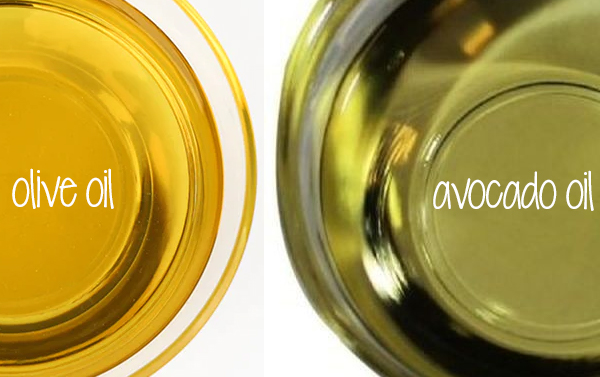Avocado oil and olive oil are two popular and versatile cooking oils known for their health benefits and culinary applications. While both oils have their own unique qualities, understanding their advantages can help you make an informed choice when it comes to incorporating them into your diet. In this article, we will explore the differences and advantages of avocado oil compared to olive oil.
First, lets explore the differences between olive oil and avocado oil in terms of color, texture, origin, and production process.
What are the Differences in Color?

Olive Oil:
Olive oil comes in different shades ranging from pale yellow to deep green, depending on factors such as the type of olives used and the degree of ripeness at the time of extraction.
Avocado Oil:
Avocado oil has a rich, vibrant green color, which is a characteristic feature of the oil extracted from ripe avocados.
What are the Differences in Texture?
Olive Oil:
Olive oil has a smooth and silky texture. The exact texture can vary depending on the type of olive oil (such as extra virgin, virgin, or refined) and its quality.
Avocado Oil:
Avocado oil has a thicker and slightly heavier texture compared to olive oil. It is known for its smooth and velvety consistency.
What are the Origins of Each?
Olive Oil:
Olive oil is derived from the fruit of the olive tree, which is primarily cultivated in Mediterranean countries such as Spain, Italy, Greece, and Tunisia. These regions are renowned for their long-standing olive oil production traditions.
Avocado Oil:
Avocado oil is extracted from the flesh of ripe avocados, which are native to Central and South America. It is produced in countries like Mexico, Peru, Chile, and the United States.
What are the Production Processes?
Olive Oil:
The production of olive oil involves several steps. First, the olives are harvested and cleaned. Then, they undergo crushing or grinding to form a paste. The paste is then pressed or centrifuged to separate the oil from the solids and water. The extracted oil is typically filtered and sometimes undergoes additional refining processes, depending on the desired quality and grade of the oil.
Avocado Oil:
The process of extracting avocado oil involves removing the skin and seed of the avocado fruit, then mashing or pureeing the flesh. The avocado flesh is subjected to hydraulic pressure or centrifugation to separate the oil from the pulp. The extracted oil is then filtered to remove any impurities.
Both olive oil and avocado oil offer distinct flavors and nutritional profiles. Olive oil is known for its versatility and is commonly used in Mediterranean cuisine, while avocado oil has a mild, buttery taste and is often used in salad dressings, dips, and high-heat cooking. Now lets explore the advantages of olive oil and avocado oil.
What are the Advantages of Avocado Oil and Olive Oil?
1. High Smoke Point:

Avocado oil boasts a high smoke point, typically around 400°F (204°C), which makes it suitable for various cooking methods such as frying, sautéing, and grilling. The high smoke point ensures that the oil does not break down and release harmful compounds when exposed to high heat, preserving its nutritional properties and flavor.
2. Rich in Monounsaturated Fats:

Both avocado oil and olive oil are rich in monounsaturated fats, which are heart-healthy fats that can help reduce bad cholesterol levels and promote cardiovascular health. However, avocado oil contains slightly higher levels of monounsaturated fats, making it an excellent choice for those looking to boost their intake of these beneficial fats.
3. Nutrient Content:

Avocado oil and olive oil are packed with essential nutrients. Avocado oil is a good source of vitamin E, an antioxidant that helps protect cells from damage. It also contains beneficial compounds like phytosterols, which may have anti-inflammatory properties. On the other hand, olive oil contains antioxidants and polyphenols that contribute to its potential health benefits.
4. Versatility in Culinary Applications:

Both oils have their unique flavors, and the choice between them often depends on personal preference and the desired taste profile of a dish. Avocado oil has a mild and buttery flavor, making it suitable for a wide range of recipes, including dressings, marinades, and baked goods. Olive oil, especially extra virgin olive oil, offers a distinctive fruity and peppery taste, making it ideal for salads, dips, and drizzling over finished dishes.
5. Skincare and Beauty Benefits:

Avocado oil is highly regarded for its potential benefits in skincare and beauty. It is rich in vitamins, antioxidants, and fatty acids, which can help moisturize and nourish the skin, promote elasticity, and reduce inflammation. Many skincare products incorporate avocado oil for its hydrating and rejuvenating properties.
Conclusion:
Avocado oil and olive oil are both valuable additions to a healthy diet, each offering its own advantages. Avocado oil's high smoke point, higher monounsaturated fat content, rich nutrient profile, versatility in cooking applications, and potential skincare benefits make it a favorable choice for many. However, olive oil's distinct flavor, antioxidant content, and culinary tradition should not be overlooked. Ultimately, the choice between these oils depends on personal preference, culinary needs, and health goals.
References:
1. Healthline - Avocado Oil vs Olive Oil: https://www.healthline.com/nutrition/avocado-oil-vs-olive-oil
2. MedicalNewsToday - What Are the Benefits of Avocado Oil for the Skin?: https://www.medicalnewstoday.com/articles/320071
3. National Center for Biotechnology Information (NCBI) - Avocado Oil: Characteristics, Properties, and Applications: https://www.ncbi.nlm.nih.gov/pmc/articles/PMC7023100/
4. American Heart Association - Monounsaturated Fats: https://www.heart.org/en/healthy-living/healthy-eating/eat-smart/fats/monounsaturated-fats
5. Olive Oil Times - Health Benefits of Olive Oil: https://www.oliveoiltimes.com/olive-oil-health-benefits
6. International Journal of Molecular Sciences - Health Benefits of Olive Oil and Polyphenols against Inflammation: https://www.ncbi.nlm.nih.gov/pmc/articles/PMC5877547/










